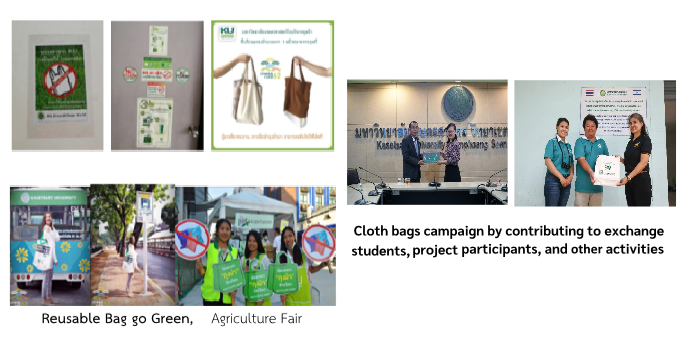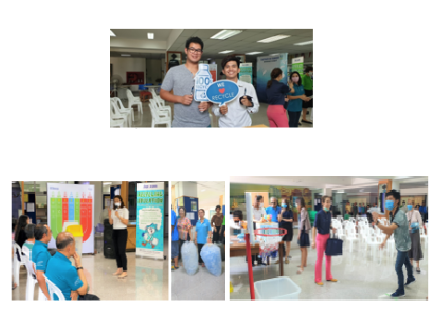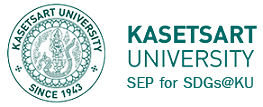
Kasetsart University has formulated a clear policy for good environmental management. The objective and principle were to be a green university as an example for students and personnel to be implemented and applied to the family and community. Therefore, the university has developed a system for efficient waste collection and management as a way to preserve the environment. For example, recycling waste, reducing the use of natural resources, reusing food waste to make bio-compost for plants to restore integrity back to nature. This practices applying within the university cause a positive effect on the environment according to the determined objectives and goals of the university. The waste recycling campaign is managed to encourage all departments to participate in waste reduction, waste separation and waste recycling. A campaign to reduce the use of paper and plastic is promoted to save paper within Kasetsart University. The campaign to use fabric bags instead of plastic bags created from the awareness of stable and sustainable environmental conservation and the problem of global warming, which is mainly caused by plastic waste. Organic waste treatment and composting organic waste are also transforming and adding value to waste and burden. Inorganic waste treatment by managing inorganic waste in different areas is to reduce the amount of waste that will be taken to landfill. Toxic waste management, collection and storage is to ensure safety. Also, during the situation of PM 3.5 dust, the university has handled the problem by spraying water to reduce the amount of dust, installing air treatment machines and setting up stations to measure daily air quality. During the spread of Covid-19 coronavirus disease, Kasetsart University has added infectious waste bins to be used to dispose of sanitary residue at various points and places. For the 2020 commencement ceremony, Kasetsart University has applied a measure for graduates who attend the graduation ceremony to wear medical masks for safety in the incidence of Covid-19. Wastewater management and water quality treatment are implemented through the treatment process, then be reused in some activities to reduce the cost of tap water bill and the contamination of the wastewater before disposing into the environment.
3.1 Recycling campaign program


3.1.1 Upcycling is the development of creative scrap materials which is the process of restoring the condition of waste materials or making materials or products failing into function liketheir original function into new, high-quality and valuable products. It is also friendly to the environment.
Upcycling is a resource-intensive process by evolving waste into a new product of value for both design and commercial use and this is a part of driving to create environmentally friendly products that take social responsibility into account. Faculty of Architecture Kasetsart University has a team of AKU upcycling designers to develop and created new ideas of discarded items and bring them back to enhance their beauty for using again.
Public service. Kasetsart University looks for the benefit of waste or used items or by starting with the upcycling or recycling process of waste materials or dysfunction used products into new products of increased quality and value. Faculty of Architecture Kasetsart University has a team of AKU upcycling designers to develop and created new ideas of discarded items and bring them back to enhance their beauty for using again.
Agricultural innovation Upcycling. It is a process that emphasizes the cost-effective use of resources by evolving waste into a new, valuable product, both in design and commercial.
Social engagement. Kasetsart University realizes the importance of using various used items or wastes to change to a new quality and value products that can be a solution to the problem of reducing global warming.
3.1.2 Waste separation and dispersal. Kasetsart University promotes waste separation. The waste bank is one of the projects to promote the separation of solid waste in order that students have the understanding of the waste separation method and also creates students’ awareness to sort waste. Build a reclaiming mechanism to reduce the amount of solid waste that has to be taken to a landfill and also to create separate bins for purchasing as well.


Agricultural Fair 2020, Kasetsart University has designated 11 waste separation points. At the main separation, there are volunteer students who will recommend how to separate waste and put in which bins. For the sub-main separation, people must separate waste by themselves. Besides, there is waste separation training for students and personnel, reuse waste is utilized in various forms, as well as walking campaign event for the students.
Public service. Kasetsart University has a public service waste separation process for students, personnel, and people outside the university to understand how to separate waste and be able to separate them by themselves. For an example of Agricultural Fair 2020, the university has 11 waste separate points for visitors at the separate waste main point there are volunteer students to serve people to learn about waste separation. It is easy to access and not complicated.
Socials engagement. At present, society is more environmentally aware. Social access, promotional campaigns and learning how to separate waste are easier. Social media is a technology that helps to communicate promptly and understandly.

3.1.3 The campaign to use cloth bags instead of plastic bags. Using cloth bags instead of plastic bags reduced waste and reduced global warming. Consumers will participate in solving environmental problems by using a cloth bag instead of a plastic bag. Bring using waste materials to make a recycle cloth bag. This will embed environmental protection behavior.
Reusable Bag go Green is a bag made by Kasetsart University for the memorial of the 2020 Agriculture Fair, in an era that everyone can save the world together and be a part in protecting the environment by reducing single-use plastics by turning to use bags that can be reused and reduce global warming.
Public service. Kasetsart University provide cloth bags as a souvenir of the Agriculture Fair 2020, in an era where everyone can save the world and together be a part in protecting the environment by reducing plastic bags by turning to use reusable bags to reduce global warming and distribute to exchange students, project participants, and other activities
Agricultural innovation Upcycling. It is the use of waste material made from vinyl signs of the Agricultural Fair to create recycled cloth bags to encourage the behavior of protecting the environment.
Socials engagement. To enhance the collection of waste to create a new culture in Thai society and create awareness of the use of the world’s resources in an economical and cost effective.
3.1.4 There are continuous activities at Kasetsart University. To focus on the campaign of global warming and reducing waste through recycling or activity. To promote a campaign to reduce the risk of harming the world and to provide students and personnel with a common understanding that everyone can be a part of solving problems by changing their behaviors to reduce global warming.


Public service. Kasetsart University has continuously organized activities within the university to focus on the campaign to reduce global warming and also reduce the amount of waste within the Kasetsart University office.
Socials engagement. It helps the environment to reduce harmful gas emissions. Particularly the current problems in the world known as the greenhouse effect that has an important impact on the environment and nature of the world. This pollution problem also affects the quality of public health. Energy reduction and saving expenses each month. If it reduces the expenses at this time, It will benefit the economy as well.
3.1.5 Kasetsart University joined the green roof project.
Public service. Green Roof Project for Friends in Need (PA) Volunteer Foundation is a campaign to sort used beverage boxes to recycle as roof sheets to people who have been affected by natural disasters and communities in need. It also promotes sustainable environmental management processes.
Agricultural innovation Upcycling. Milk carton boxes sorting through the beverage carton (UHT) recycling process. It is one of the materials that can recycle into many materials because of all its components, such as paper, plastic, and an aluminum cover of the carton can reuse. The roof property of the milk carton is durable, not easily broken flexible and also a fire resistant.
Socials engagement. Inviting students and personnel to donate milk cartons for the Green Roof Project to build a roof.
3.1.6 E-waste sorting campaign Kasetsart University Sriracha Campus, in cooperation with AIS Eastern Region, creates a campaign network partner by the university and acts as a medium for supporting the campaign. There is an increase knowledge to create awareness for new students and personnel to sort and remove electronic waste (E-Waste) properly and to collect e-waste to AIS for disposing properly by the Zero Landfill process for a better environment and to reduce electronic waste residue in the country sustainably. There is Mr. Pravit Jitpunya, Head of Operations Department, Eastern Region, AIS, Asst.Prof.Dr.Seree Padaynak, Vice-Rector for Sriracha Campus Kasetsart University, and Assistant Professor Dr. Pattarawadee Sumthong, Dean of Faculty of Science, Sriracha joined the project.


3.1.7 Faculty of Fisheries, Kasetsart University
Recognized the impact and the importance of solving plastic problems today. Indorama Ventures Public Company Limited or IVL incorperated with the Faculty of Fisheries Kasetsart University organized the activities to promote recycling knowledge for faculty members and personel of the Faculty of Fisheries to build awareness of PET recycling value by giving knowledge about proper sorting of waste materials, type of plastic, and PET recycling process in accordance with circular economy principles.In addition, the faculty has organized a bottle exchange activity for a shirt. Participants are able to exchange 100 PET bottles of 500 ml or more for a shirt made from 100% recycled PET fibers under IVL’s DEJA ™ brand. Moreover, the fibers that produced one shirt are equivalent to recycling 12 PET bottles, and this event received a great response and collected over 100 kg of PET bottles which will be recycled at IVL’s recycling plant in Nakhon Pathom Province.
Challenge. The waste at Kasetsart University is increasing after the university had a waste separation campaigned. Students and personnel cooperate well. Therefore the promotion of recycling waste separation would be beneficial to the society. Besides, reducing waste, waste recycled is created value for the products. Waste reducing policy “zero waste” is an idea of giving gifts for the graduation ceremony at Kasetsart University 2019. It will greatly reduce the number of luxury items. And waste separation policy from the original source reduced the amount of waste in the future.
Opportunity. Every activity that Kasetsart University had conducted due to its desires for the students and personnel to recognize waste problems for better improvement and the results from the recycling activity were reduced waste items. This will reduce the use of resources efficiently, in response to government policy. However, Garbage collection is the first and foremost the original source of waste and if properly handled the results is more efficient, which everyone can cooperates together by using the 3R principle that is, Reuse is used only as needed. Reduce is a repeatedly use to reduce an amount of waste, and Recycle is converting (waste) into reusable material to reduce the amount of waste.
